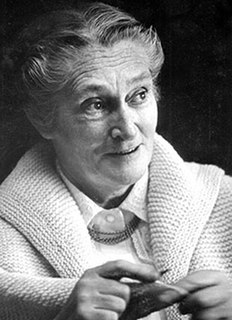A Quote by Isaac Asimov
Intelligence is an accident of evolution, and not necessarily an advantage.
Quote Topics
Related Quotes
Human beings have a variety of intelligences, such as cognitive intelligence, emotional intelligence, musical intelligence, kinesthetic intelligence, and so on. Most people excel in one or two of those, but do poorly in the others. This is not necessarily or even usually a bad thing; part of Integral wisdom is finding where one excels and thus where one can best offer the world one's deepest gifts.
Does there exist an Infinity outside ourselves? Is that infinity One, immanent and permanent, necessarily having substance, since He is infinite and if He lacked matter He would be limited, necessarily possessing intelligence since He is infinite and, lacking intelligence, He would be in that sense finite. Does this Infinity inspire in us the idea of essense, while to ourselves we can only attribute the idea of existence? In order words, is He not the whole of which we are but the part?
You can be a thorough-going Neo-Darwinian without imagination, metaphysics, poetry, conscience, or decency. For 'Natural Selection' has no moral significance: it deals with that part of evolution which has no purpose, no intelligence, and might more appropriately be called accidental selection, or better still, Unnatural Selection, since nothing is more unnatural than an accident. If it could be proved that the whole universe had been produced by such Selection, only fools and rascals could bear to live.
The very comprehensibility of the world points to an intelligence behind the world. Indeed, science would be impossible if our intelligence were not adapted to the intelligibility of the world. The match between our intelligence and the intelligibility of the world is no accident. Nor can it properly be attributed to natural selection, which places a premium on survival and reproduction and has no stake in truth or conscious thought. Indeed, meat-puppet robots are just fine as the output of a Darwinian evolutionary process.
Evolution in the biosphere is therefore a necessarily irreversible process defining a direction in time; a direction which is the same as that enjoined by the law of increasing entropy, that is to say, the second law of thermodynamics. This is far more than a mere comparison: the second law is founded upon considerations identical to those which establish the irreversibility of evolution. Indeed, it is legitimate to view the irreversibility of evolution as an expression of the second law in the biosphere.
The issue, as correctly emphasized by Carl Sagan, is the probability of the evolution of high intelligence and an electronic civilization on an inhabited world. Once we have life (and almost surely it will be very different from life on Earth), what is the probability of its developing a lineage with high intelligence? On Earth, among millions of lineages of organisms and perhaps 50 billion speciation events, only one led to high intelligence; this makes me believe in its utter improbability.





































